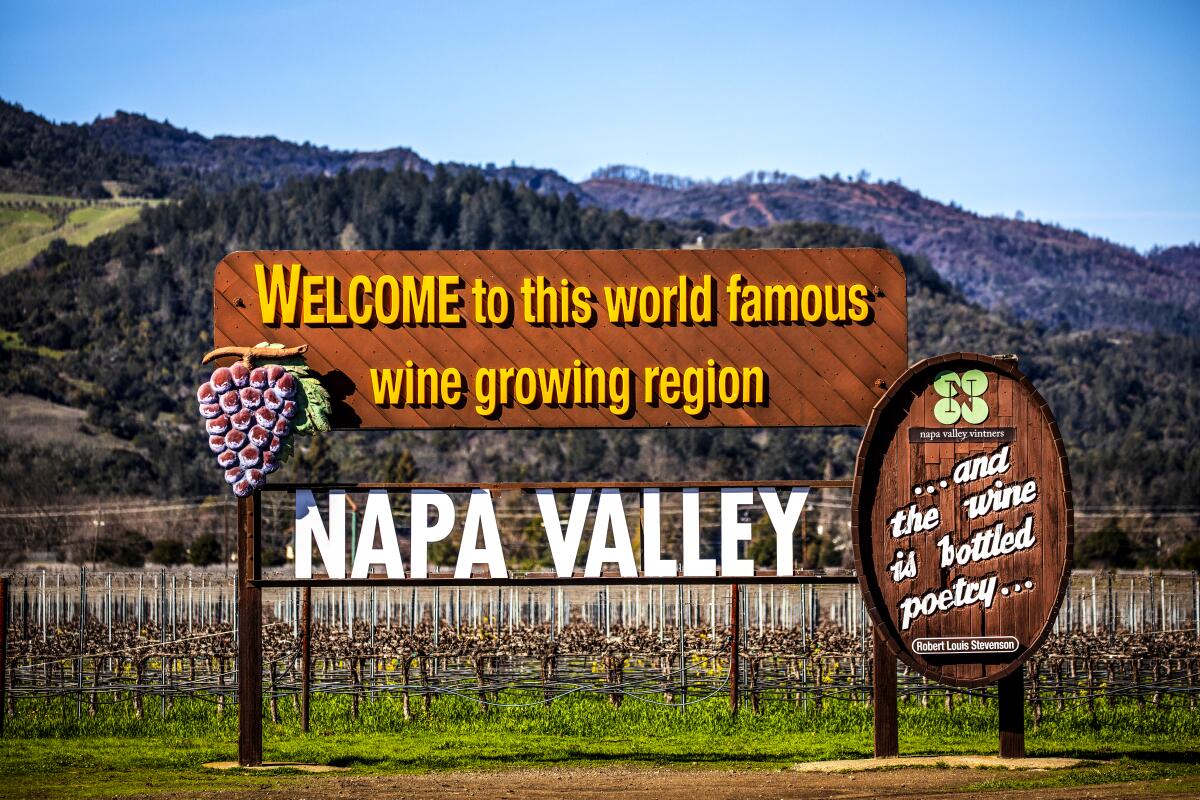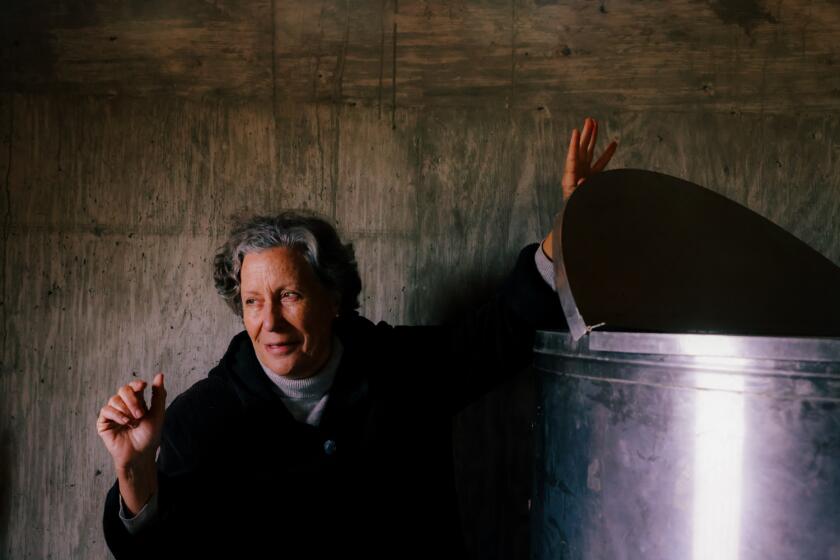Mystery among the vines: Why is the FBI probing some of Napa Valley’s fanciest wineries?

St. Helena, Calif. — Highway 29 winds along the floor of the Napa Valley through Yountville and St. Helena and up into Calistoga, passing by vineyards that produce some of the most celebrated and expensive wines in the world.
The road, lined with rows of grapevines planted along sun-dappled hills, is justly famous for its stunning beauty — and the stunning number of Michelin-rated restaurants, spas and boutique inns that have popped up among the vineyards.
And lately, for locals anyway, it is also the source of a pressing mystery: Why have so many of the fancy wineries along this road — and their rich and powerful owners — been named in federal subpoenas that were served late last year on Napa County?
“Please provide any and all documents relating to the following individuals, entities, and/or projects,” one subpoena says, before unspooling a roster that reads more like a high-end tourist brochure than what is normally found in a court docket.
Among the glittering names whose county records are being sought are Hall Wines, known for its bold cabernets and luxe St. Helena winery with a towering statue of a silver rabbit. Kathryn Hall, a former U.S. ambassador to Austria, is also named, as is her husband, Craig Hall, a former part-owner of the Dallas Cowboys whose art collection is so revered that portions went on loan to the Jeu de Paume arts center in Paris.
Caymus Vineyards, whose cabernet is a frequent favorite of Wine Spectator, and owner Charles J. “Chuck” Wagner are listed in the records request, as are Wagner’s son, Charlie Wagner, and his vineyard, Mer Soleil.
The inventory of luminaries rolls on: Robin Baggett, a former general counsel for the Golden State Warriors, and his Alpha Omega Winery. Dave Phinney, whose “Prisoner” label changed the industry. Grant Long Jr. and his wineries Aonair and Reverie II. Jayson Woodbridge and Hundred Acre. Darioush Khaledi and his namesake winery. And on it goes — 40 people and businesses in total, including Napa’s exclusive Meritage Resort and Spa.
The subpoena seeking records on the wineries and their owners, dated Dec. 14, 2023, is filed under the name of Patrick Robbins, first assistant U.S. attorney for the Northern District of California. It also references an FBI agent, Katherine Ferrato, who has experience working on complex financial crimes.
Separately, a trial attorney working in the Department of Justice’s Antitrust Division filed a subpoena, dated Dec. 7, requesting records pertaining to the Upper Valley Waste Management Agency, a joint powers authority that manages trash and recycling services for Calistoga, St. Helena and Yountville. A third subpoena seeks records on the Napa County Airport, which local officials are seeking to modernize. A fourth was served on the county’s farm bureau, which in recent years has become a powerful political voice on behalf of wineries.
If Napa County officials have any idea what’s going on, they aren’t saying. “Napa County is not being investigated,” county spokesperson Holly Dawson said. “We were issued a subpoena for records. We know nothing more.”
The U.S. attorney’s office in San Francisco declined to comment, as did the FBI’s San Francisco office.
Some of those named in the probe did not respond to interview requests. Some who did respond said they are stumped.
Craig and Kathryn Hall released a statement through their director of public relations: “We are aware that there is an ongoing investigation. However, we do not know the scope or the details and it would be inappropriate for us to speculate,” the couple said.
Baggett, of Alpha Omega, said his operations had “nothing pending” before the county and therefore “zero” documents that would have been turned over. He said it has been “a big waste of time daily explaining that we have done nothing wrong.”
Baggett dismissed the probe as a “fishing expedition” or worse, adding: “I hope it’s not a political witch hunt.”
Like several people interviewed, Baggett speculated that one person of interest could be Napa County Supervisor Alfredo Pedroza, who has generated ire among local environmental activists because he is perceived as pro-agriculture, which in Napa Valley almost always means pro-winery.
Some of the entities whose records were subpoenaed have donated to Pedroza’s political campaigns. A small number were involved in a controversial land deal involving Pedroza’s family that is adjacent to property the Halls sought to develop in Napa Valley’s eastern hills.
For years, Craig and Kathryn Hall had sought to construct a 208-acre vineyard on Walt Ranch, 2,300 acres of oak woodland they owned in Napa’s Atlas Peak appellation, prized for its elevation and rich volcanic soil. The property was undeveloped when the Halls bought it in 2005, but zoned for agriculture. Their efforts to clear space for a vineyard drew fierce opposition from environmental groups that said it would endanger oak trees and animal habitat, deplete limited water supplies and boost fire risk.
After years of regulatory and legal wrangling, the development was tentatively approved by the Board of Supervisors in late 2021. Pedroza voted in favor of the project.
His vote set off a new controversy when a local activist, documentary filmmaker Beth Nelsen, discovered that Pedroza’s father-in-law had bought property adjacent to the proposed vineyard. The San Francisco Chronicle followed with reports that Pedroza and his wife helped secure a loan for the purchase, using his Napa home as collateral. Critics said the Walt Ranch development would no doubt raise property values in the area — including the property Pedroza’s father-in-law had purchased — and that Pedroza should have publicly disclosed his involvement as a conflict of interest.
Pedroza denied he had a financial interest in the property, but recused himself from subsequent votes on Walt Ranch.
In late 2022, the Halls gave up on the idea of developing the vineyard, and worked out a deal to preserve the land through the county land trust.
The FBI searched Pedroza’s home in December, according to the Santa Rosa Press Democrat. He opted not to run for another term on the Board of Supervisors and will end his tenure later this year.
Pedroza did not respond to calls and emails seeking comment from The Times. Earlier this month, he sent an emailed statement to the Press Democrat: “I believe everyone should cooperate fully with all branches of federal and state government and I have always encouraged citizens in Napa and all Napa public authorities to do so. There is no reason to do otherwise.”
Adding to the intrigue — and the grief — a key figure in Napa County, Ryan Klobas, died in an apparent suicide in January, weeks after the Department of Justice served a subpoena on the Napa County Farm Bureau, which Klobas headed. Klobas joined the farm bureau in 2017 as policy director and was named chief executive in 2018. Under his leadership, the bureau doubled its membership and formed a political action committee to work on behalf of the bureau that raised funds to successfully defeat a county initiative that would have limited the growth of wineries.
The bureau’s interim CEO, Tawny Tesconi, confirmed the bureau had received a subpoena but declined any additional comment.
As the mystery swirls, one thing is clear: The federal probe comes amid a bitter divide among longtime vintners and residents over Napa Valley’s future. Should the valley keep adding vineyards? Or has the proliferation of wineries and tourists and traffic reached a tipping point that threatens to erode its natural environment and rural charm — no matter how pretty the rows of grapes in the slanting afternoon light?
“Our entire economy depends on the success of our agriculture, and our wine and hospitality,” said former Yountville Mayor John Dunbar, a supporter of the wine industry. But the fight over land use has grown “toxic,” he said. “People are being attacked because they are for or against a winery permit.”
Geoff Ellsworth, a former mayor of St. Helena, is among those who believe the forces of development pose a grave risk to the valley’s environment and invite political corruption. What’s more, he worries that the influx of hotels and tourist attractions are “hollowing out” his hometown and others on the valley floor.
Vintners and conservationists in Valle de Guadalupe are concerned that a tourism boom and water scarcity will lead to disaster.
Ellsworth, who grew up in St. Helena and returned about a decade ago after years in Los Angeles, said a breaking point for him was when he learned of a proposal to redevelop St. Helena’s City Hall into a hotel, as well as a decision that did away with tiered water rates. “I was like, ‘Wait a second,’” he said. Soon after, he decided to run for City Council and eventually became mayor.
And then he started hearing about problems at the landfill in the hills above Calistoga, which takes in trash from many of the wineries, as well as waste from nearby counties. “Fires,” he said. “Radioactive waste. I’m the mayor, and I’m like what is going on?”
Ellsworth eventually joined forces with another citizen concerned about the landfill, Anne Wheaton. Now a couple, they have devoted the last few years to exposing what they say is a complicated web of environmental and worker safety violations that they worry could make the landfill hazardous.
In late 2020, Ellsworth said, he was sufficiently outraged that he reached out to the Department of Justice. He and Wheaton were gratified to read the subpoena the department filed with the county asking about dealings with the Upper Valley Waste Management Agency. It seeks information on contracting, as well as communications among agencies and elected officials.
Ellsworth said he isn’t privy to the scope or details of the federal probe or what role the landfill might play. But he believes powerful interests have a stake in the outcome — enough so that he and Wheaton have moved out of the county.
“The amount of money at stake here is billions of dollars,” Ellsworth said. “We wanted to distance ourselves from the situation.”
More to Read
Sign up for Essential California
The most important California stories and recommendations in your inbox every morning.
You may occasionally receive promotional content from the Los Angeles Times.












